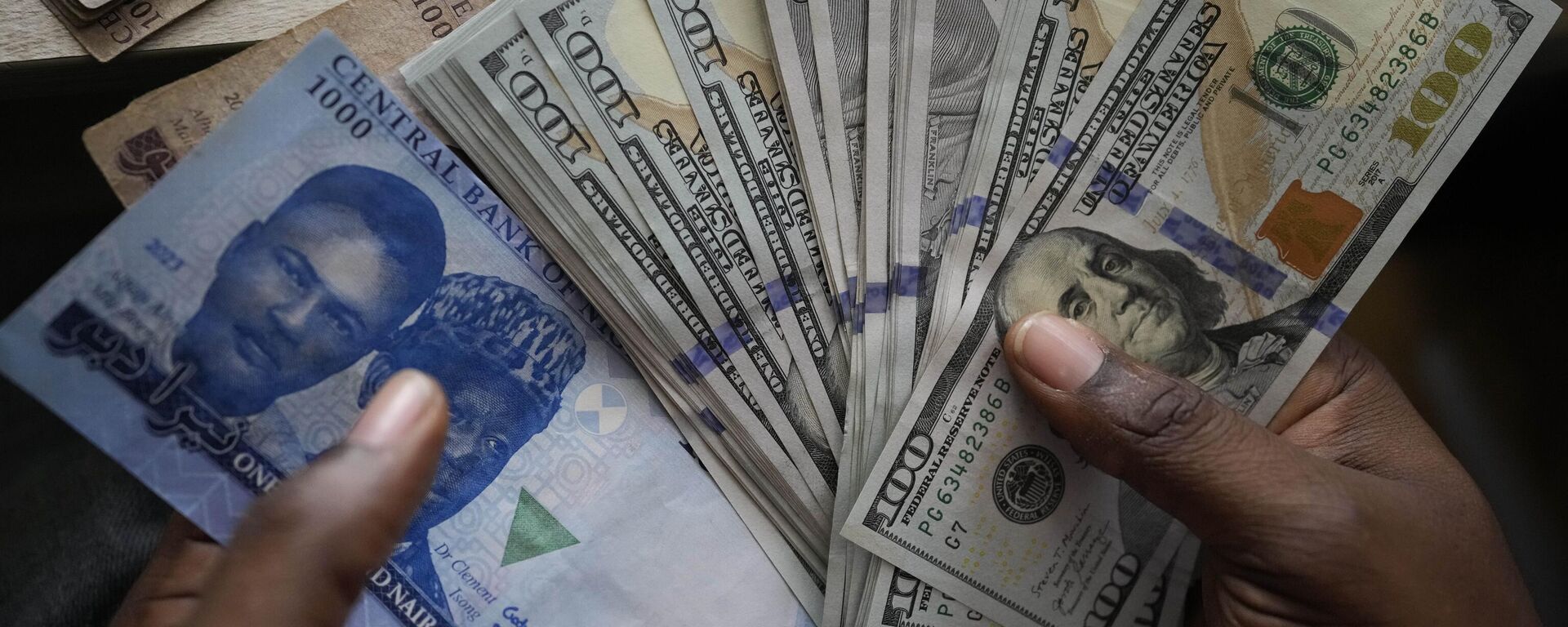https://en.sputniknews.africa/20231114/nigerian-central-bank-refocuses-its-financing-role-to-support-economic-growth-1063544893.html
Nigerian Central Bank Refocuses Its Financing Role to Support Economic Growth
Nigerian Central Bank Refocuses Its Financing Role to Support Economic Growth
Sputnik Africa
Nigerian President Bola Tinubu, who came to power in May, announced plans to revive Nigeria's economy after a decade of stagnation and launched a series of... 14.11.2023, Sputnik Africa
2023-11-14T17:49+0100
2023-11-14T17:49+0100
2023-11-14T17:49+0100
sub-saharan africa
economy
nigeria
bola tinubu
west africa
central bank
economic growth
reforms
https://cdn1.img.sputniknews.africa/img/07e7/0a/1f/1063221698_0:160:3072:1888_1920x0_80_0_0_c5a5cb10c928e51b73b0a388aa16f9e4.jpg
Nigeria's central bank will eschew direct fiscal intervention and play a more limited advisory role in supporting the government's economic growth program, Governor Olayemi Cardoso told Western media on Tuesday.The bank's current policy, the governor noted, blurs the lines between monetary and fiscal policy, eroding its ability to manage inflation and foreign exchange reserves effectively.He noted that while the central bank does not have a "magic wand" to solve economic problems, the bank can support economic growth by promoting institutions and financial products to support emerging sectors of the economy, expanding financial inclusion, and bringing together multilateral stakeholders to support government and private sector initiatives.Olayemi Cardoso, the former chairman of Nigeria's Citibank, took over as governor of the central bank in late September. He succeeds Folashodun Shonubi, who served as acting governor of the central bank following the suspension and arrest of former governor Godwin Emefiele.In early June, Tinubu suspended Emefiele amid investigations into his agency and planned reforms in the country's financial sector, aimed at the economic growth of the West African nation.On Monday, as part of efforts to revive economic growth, Nigeria's Minister of Industry, Trade and Investment, Doris Uzoka-Anite, told the media that the nation would encourage foreign investment in the country by increasing tax incentives for foreign investors.The weakening of the local currency remains another concern for the government. In mid-June, the central bank allowed market forces to determine the exchange rate of the naira. According to media reports, the naira has weakened 8.9% against the dollar in four months on the official market, the biggest drop since June 20.In an effort to help the local currency reach a "fair price" by 2024, the government announced in late October that new foreign exchange regulations, including a crackdown on illegal currency trading, are planned for the country.
https://en.sputniknews.africa/20231031/new-currency-rules-planned-in-nigeria-to-help-national-currency-reach-fair-price-by-next-year-1063224204.html
nigeria
west africa
Sputnik Africa
feedback@sputniknews.com
+74956456601
MIA „Rossiya Segodnya“
2023
Maxim Grishenkin
https://cdn1.img.sputniknews.africa/img/07e7/0a/17/1063018107_0:0:1104:1103_100x100_80_0_0_03090c85a11f5d2e8a19cf1d989443c9.jpg
Maxim Grishenkin
https://cdn1.img.sputniknews.africa/img/07e7/0a/17/1063018107_0:0:1104:1103_100x100_80_0_0_03090c85a11f5d2e8a19cf1d989443c9.jpg
News
en_EN
Sputnik Africa
feedback@sputniknews.com
+74956456601
MIA „Rossiya Segodnya“
Sputnik Africa
feedback@sputniknews.com
+74956456601
MIA „Rossiya Segodnya“
Maxim Grishenkin
https://cdn1.img.sputniknews.africa/img/07e7/0a/17/1063018107_0:0:1104:1103_100x100_80_0_0_03090c85a11f5d2e8a19cf1d989443c9.jpg
economy, nigeria, bola tinubu, west africa, central bank, economic growth, reforms
economy, nigeria, bola tinubu, west africa, central bank, economic growth, reforms
Nigerian Central Bank Refocuses Its Financing Role to Support Economic Growth
Nigerian President Bola Tinubu, who came to power in May, announced plans to revive Nigeria's economy after a decade of stagnation and launched a series of reforms, including the removal of costly fuel subsidies and the liberalization of the foreign exchange market.
Nigeria's central bank will eschew direct fiscal intervention and play a more limited advisory role in supporting the government's economic growth program, Governor Olayemi Cardoso told Western media on Tuesday.
The bank's current policy, the governor noted, blurs the lines between monetary and fiscal policy, eroding its ability to manage inflation and foreign exchange reserves effectively.
"There is need to pull the central bank back from direct development finance interventions into more limited advisory roles that support economic growth," Cardoso pointed out.
He noted that while the central bank does not have a "magic wand" to solve economic problems, the bank can support
economic growth by promoting institutions and financial products to support emerging sectors of the economy, expanding financial inclusion, and bringing together multilateral stakeholders to support government and private sector initiatives.
Olayemi Cardoso, the former chairman of Nigeria's Citibank, took over as governor of the central bank in late September. He succeeds Folashodun Shonubi, who served as acting governor of the central bank following the suspension and arrest of former governor Godwin Emefiele.
In early June, Tinubu suspended Emefiele amid investigations into his agency and planned reforms in the country's financial sector, aimed at the economic growth of the West African nation.
On Monday, as part of efforts to revive economic growth, Nigeria's Minister of Industry, Trade and Investment, Doris Uzoka-Anite,
told the media that the nation would encourage foreign investment in the country by increasing tax incentives for foreign investors.
The weakening of the local currency remains another concern for the government. In mid-June, the central bank allowed market forces to determine the exchange rate of the naira. According to media reports, the naira has weakened 8.9% against the dollar in four months on the official market, the biggest drop since June 20.
In an effort to help the local currency reach a "fair price" by 2024, the government announced in late October that new foreign exchange regulations, including a crackdown on illegal currency trading, are planned for the country.



